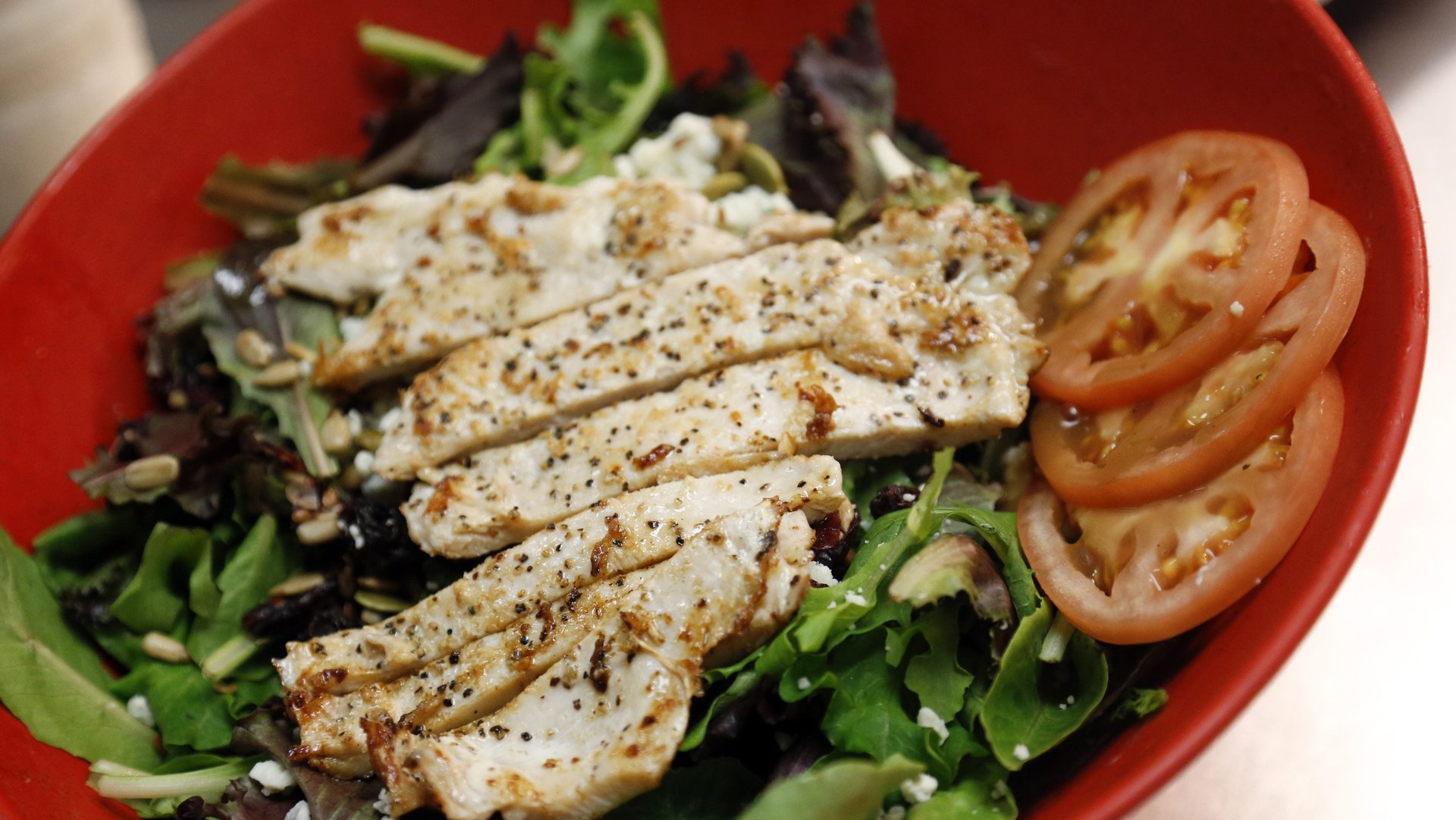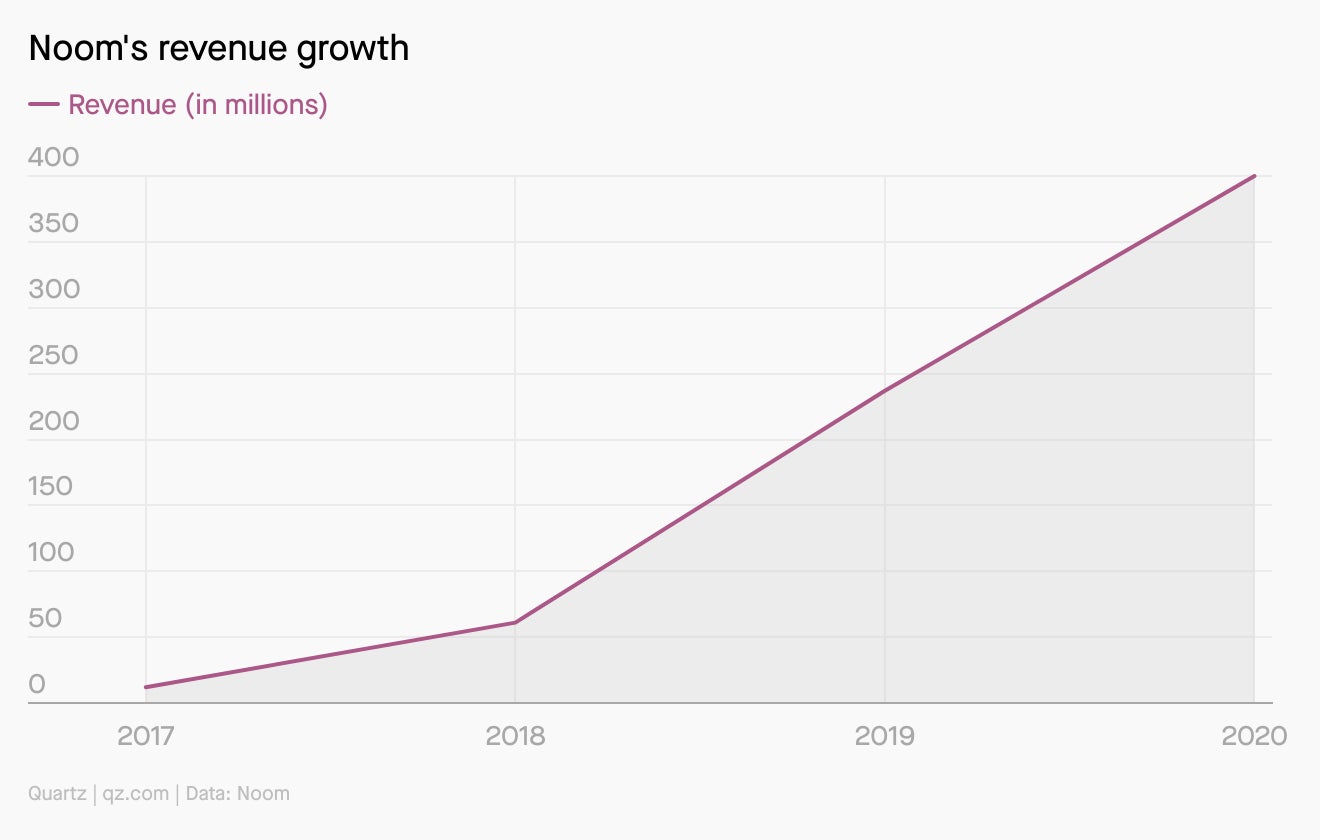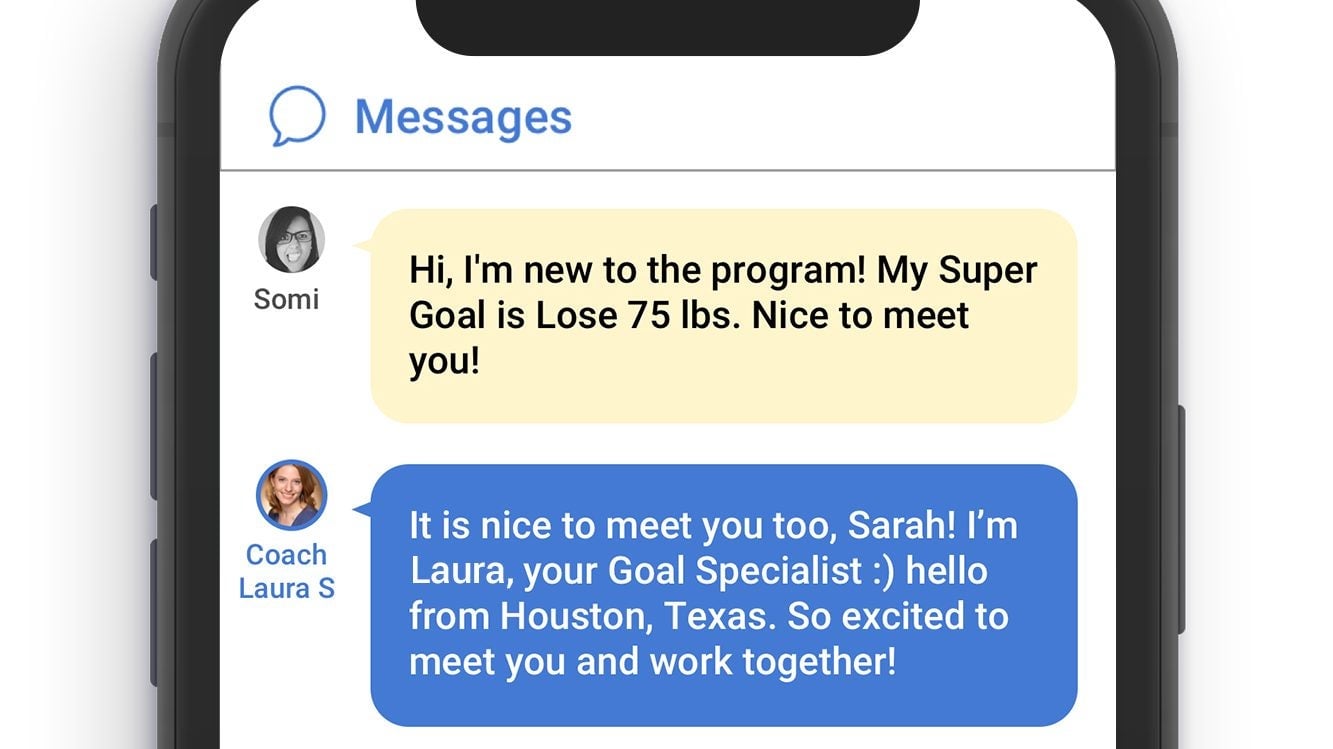For members—A Noom of one’s own
Hi Quartz member,


Hi Quartz member,
If we were eating our feelings before the pandemic, we’re now drinking, snacking, filleting, air-frying, and grilling them, too. Some 40% of respondents to a survey from the American Psychological Association reported weight gain over the past year. And while a little waistband forgiveness may be in order, given larger public health concerns, wellness app Noom generated $400 million in 2020 revenue, up 100% over 2019. So what’s actually in Noom’s special sauce?
First, a recap: Saudi Aramco is no longer the world’s most profitable company, gamers turned Discord into a $10 billion juggernaut, and robot garbage hunters are coming to clean up space. Biden’s infrastructure bill will make or break his climate legacy, and the EU is sanctioning China for the first time since Tiananmen. Can a new vaccine prevent opioid overdoses? Is college still a good deal? Why is Robinhood’s IPO filing confidential? Asked and answered.
Your most-read story this week: GameStop is planning a stock sale to cash in on its Reddit craze. And most relatable member goes to the reader of BMI calculators aren’t accurate, but our body fat calculator is. Points for your prep work.
Okay, now step on the scale and unlock your phone. We’re digging into Noom.
What is Noom?
Noom (“Moon” spelled backwards) was co-founded in 2008 by tech entrepreneur Saeju Jeong, who moved to New York from Korea in the mid-aughts, and Artem Petakov, a Ukraine-born former Google engineer. The pair first developed other iterations of fitness apps, including one called CardioTrainer, which informed what eventually became Noom. Jeong and Petakov are now Noom’s CEO and president, respectively.
Noom asks users to track what they eat, weigh in daily, recall their goals frequently, and study nutrition, motivation, and decision-making, all in five-minute-per-day gamified lessons. The idea is to unlearn your bad habits with a curriculum based on psychological principles, lose one to two pounds per week, and keep that weight off. Absent from the app and Noom’s advertising are tropes like before-and-after photos, frozen meals, low-cal shakes, and magic bullets.
The app leans heavily on AI, but the company says all users are also connected to a human coach and personalized options. (The Noom workforce includes 3,000 coaches, 90% of whom are full-time employees.) Nutritionists tend to give Noom a stamp of approval because it helps people lose weight by eating fewer—and more nutritious—calories. Where WW (formerly Weight Watchers) has “points,” Noom uses a color-coded system to guide eating decisions.
🟢 The least calorically dense and/or most nutrient-dense food options, which should represent 30% of what you eat in a day. Fruits and veggies, whole grains, whole wheat bread, tofu, and non-fat dairy are all “green” foods.
🟡 The middle-ground foods—including low-fat dairy, black beans, chicken breast, tuna, salmon, couscous, plantains, rice noodles, legumes, and avocados—can provide 45% of your daily calories.
🔴 No more than 25% of your daily diet should come from the most calorically dense and/or least nutrient-dense foods, including nut butters and olive oil, pita bread, flour tortillas, plus all the hard-to-resist stuff, like red wine, sugary foods, burgers, and fries.
Today, Noom has been downloaded 50 million times in more than 100 countries and offers localized editions for Japan, China, Germany, Spain, and the UK. The company also recently announced its intention to expand into the lucrative B2B marketplace. And while it has been evaluating a public offering, there are no definitive plans for one just yet.
$72 billion: Size of the industry when you include diet foods and drinks, health clubs, weight-loss surgery, and weight-loss pharmaceuticals
$300 billion: Projected value of the global weight loss market by 2026
2: Pounds per month Americans gained during the pandemic, according to one very small study
$59: Monthly cost of a Noom membership
$114.7 million: Total Noom has raised from investors since 2016
3.7 million: Food items profiled in Noom’s database.
78%: Users in one study who self-reported that they kept the weight off nine months after using Noom
Charting Noom revenue

Origin story
Noom CEO Saeju Jeong, 41, says the app’s inspiration came from his late father, a noted doctor and hospital CEO in South Korea who died of lung cancer when Jeong was 20. In the year before he died, Jeong’s father talked to his son about what being a doctor felt like: “Rather than being an expert in healthcare, he was a ‘sick care expert.’ He felt powerless and hopeless,” Jeong told Everyday Health. “Disease prevention was so difficult to manage, and he wondered why.”
Jeong thought he’d also become a physician, but after failing to get into medical school decided to study engineering. He eventually moved to the US, where he met Petakov at a dinner party. While weight loss is a kind of gateway drug for Noom, Jeong has said the app is ultimately meant to help with all kinds of behavioral changes. In 2017, Noom’s diabetes prevention program became the first digital-only program to win approval from the US Centers for Disease Control and Prevention. The company is currently beta-testing a program for stress and anxiety.

🤘 fact
Jeong also started the first heavy metal record label in South Korea, BuyHard Productions, when he was 19 years old. The mild-mannered CEO still listens to metal before almost all of his meetings, according to a company spokesperson.
Pop quiz
Which of these diets is not on Good Housekeeping’s list of the best eating plans for 2021, as selected by a registered dietician?
- Mediterranean
- Keto
- Nordic
- DASH
- Noom
- Volumetrics
- Flexitarian
(Answer at the end of the email.)
Dark side of the Noom
Not everything is sunny on this planet. Here’s a look at some complaints about the company:
- Gamifying behavioral change isn’t all good. The app that bills itself as deeply knowledgeable about human behavior is naturally great at guiding its users’ thought processes. For example, when you sign up for Noom, a bot estimates how long it will take to hit your goals, but adjusts that figure as you continue to enter data about yourself. Guess what? You’ll inevitably be told that your weight-loss project will actually take less time than that first (anchoring) prediction.
- Not all of Noom’s users and employees are satisfied. Even many of the positive Glassdoor reviews by current and former employees mention low pay and poor benefits, while unfavorable reviews mention unrealistically high caseloads for coaches. And yet Noom has also been named to several best workplaces lists.
- Noom has had stumbles already. The most public ones involved surprise charges on credit card bills (not uncommon for subscription services). Hundreds of customers have complained to the Better Business Bureau, and there’s even been a class-action lawsuit against the company. Last summer, Jeong had to address Refundgate in an open letter on Noom.com; he promised to expand the customer support team.
- Noom works! According, in part, to Noom. The app’s marketing and PR materials cite weight-loss success rates and other results that often make it into press accounts of the company, but all of that (albeit interesting) research is conducted by or for Noom. (Its spokesperson notes that “Noom has more than 20 published studies, each of which has been validated by peer review.”)
Quotable
“We focus on food, fitness, sleep, and stress management. If any one of these things is lacking, the whole system suffers. It’s like trying to drive your car with a wheel missing.”—Andreas Michaelides, chief psychology officer at Noom
Three testimonials
😃 A satisfied user. “I associate sitting and watching a movie in a theater with eating since it’s a childhood memory…but it makes no sense at all that I need to eat when I watch a movie. By knowing this I was able to bring healthy food with me so that I could fulfill the ritual without cheating.” —Marc Suster, managing partner at Upfront Ventures (with a pre-Covid example)
🤷♀️ A nonplussed customer. “All they provide is logical and motivational assistance, and if that’s what you need, then this might be the thing for you. They’re not going to give you a personal trainer, they’re not going to give you workouts, or anything like that…But they do provide you with, like, an accountability partner situation.” —“Jaie Elizabeth,” life coach (video)
🤑 An admiring investor: “What struck me most was the unbelievable dedication, perseverance, and execution of this team…It’s not one of these overnight successes; it took 12 years to build.” —Miyuki Matsumoto, managing partner at Aglaé Ventures
Answer 🔑
Which eating plan is not on Good Housekeeping’s list? The Keto diet has fierce defenders, but nutritionist Zee Krstic doesn’t condone schemes that eliminate entire food groups. (Keto devotees avoid carbs.) Krstic also doesn’t endorse intermittent fasting or the Whole30 diet.

Keep learning:
- I tried weight-loss app Noom again after a year—here’s what changed (USA Today)
- Mind the app: Psychology-powered wellness platform Noom is helping people shed pandemic pounds (Rolling Stone)
- Three ways behavioral psychology might help you lose weight (The Conversation)
- A goal with a plan beats a resolution every day of the year (Quartz)
- A short history of terrible diets (Quartz)
- How to create good new habits, according to a Stanford behavior scientist (Quartz)
Thanks for reading! And don’t hesitate to reach out with comments, questions, or companies you want to know more about.
Best wishes for a well-behaved end to your week,
